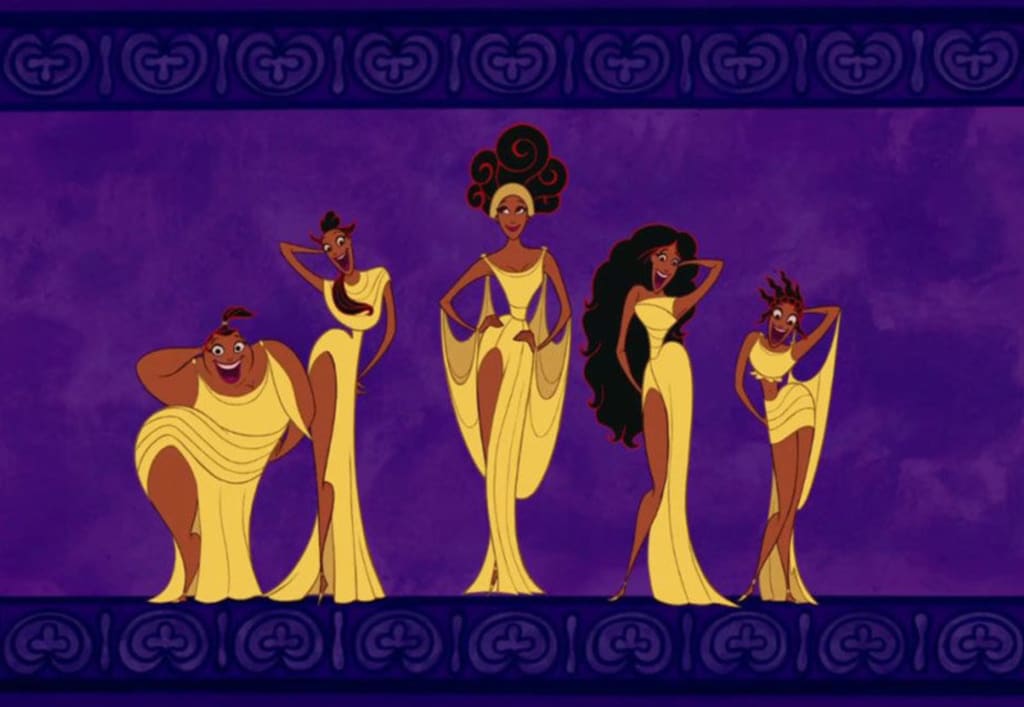
If you’re a fan of Disney’s Hercules, you’ve seen these five women in action. They are the Muses, a collection of goddesses of the arts. The daughters of Greek God, Zeus and the Titaness Mnemosyne, there were originally nine of them, each embodying a different aspect of the creative arts. Calliope (Epic Poetry), Clio (History), Euterpe (Flutes and Lyric Poetry), Thalia (Comedy), Melopmene (tragedy), Terpsichore (dance), Erato (love poetry), Polyphymnia (sacred poetry) and Urania (astronomy) all inspired the creation of art through their own songs, dances, writing, music, and mime. They were invoked at the start of epic poems and tales like The Illiad or The Odyssey to have the storyteller exist a vessel that the muses could work through to successfully tell the tales of these heroes.
The idea of the Muses being the proclaimers of heroes has been somewhat been diluted. Instead of being used to refer to the Goddesses of the Arts who would use humans as conduits for their arts, a muse is more commonly used to refer to someone (typically female) whose very existence inspires someone else (typically male) to create great works of art. The sketchy gender politics of that aside, Disney’s Hercules begins with a reminder of who the Muses really were and does something interesting with how they exist as storytellers in the retelling of the Greek myth. The differences between the original stories of Heracles vs. Disney’s Hercules have been addressed to death, but the Muses are an example of where their depiction was somewhat accurate to how they are depicted in Greek myth. We first hear them as they take the responsibility of telling the story of the movie away from a disembodied, deep gravelly voice. They don’t seem to be a fan of his approach, Thalia calls him out for making the story sound like a Greek tragedy (which… the original low-key is) and Calliope says “We’ll take it from here, darling.” And they do just that. They take the role of the storyteller on their own terms and in their own musical language.
Alan Menken’s typical musical theatre sound, which is used in his previous Disney films like The Little Mermaid, Beauty and the Beast, and Pocahontas is replaced by up-tempo Gospel-flavoured R&B. Five of the nine Muses, Calliope, Melpomene, Terpsichore, Thalia, and Clio are shown to be five black women who flaunt their artistry through thickly layered harmonies, impressive vocal adlibs, and extravagant choreography as the film fully embraces their role as performers and storytellers as the movie starts. They deliver the necessary backstory regarding the rise and fall of the titans and help narrate the films take on the origins of Hercules, and remain fabulous while doing so. The directors (Ron Clements and John Musker) said that the exhilarating and narrative nature of gospel music was the inspiration for the music being chosen to modernise the Greek storytelling, while drawing influence from a genre of music that would be used to talk about God(s). In casting the muses, the directors wanted dynamic voices who could sing the style well (which explains the proposed casting of Patti LaBelle, Aretha Franklin, or Gladys Knight), but knew how to blend and sound strong together in an ensemble, resulting in the established cast of the movie.
The designs of the Muses is based on their voice actresses. The animators watched Lillias White (Calliope), Roz Ryan (Thalia), LaChanze (Terpsichore), Cheryl Freeman (Melpomene), and Vanesse Y. Thomas (Clio) as they recorded the songs for the film and captured their physical essences in the design of the Muses, and then asked the actresses what they wanted their respective Muse to look like. The Muses sport a variety of different toga patterns and hairstyles, from long blow-outs, to bantu knots, showing a range of black hair styles, as well as being examples of literal divine black excellence within the film.
The Muses being remodeled as black women for the movie is a change from their depictions in paintings of classical art, but the inclusion of black people in ancient Greek mythology is not a new thing. Homeric poetry described black people as being part of many social classes and roles, and even being semi-divine beings, whose home was used as an oasis for the Gods. There is something joyful in the description of black people as being God-like, being part of ancient poetry, and that being recreated in the retelling of an ancient myth. Aesthetic and musical characterisation of the Muses not only represent black culture in a positive light, but marries black culture to a well-known story.
From the behind the scenes work on building the characters, to the Muses taking the narrative reigns in the movie, the Muses were a depiction of black women being given agency within a space to create something on their own terms. The disembodied voice at the start willingly stepping down at Calliope’s suggestion gave them free rein to tell this story how they thought fit. In doing this, the Muses became a highly recognisable and memorable part of Hercules. The Muses in this film existed as black creatives that, until their reveal, could have blended into the background, left to be voiceless in the story of Hercules. But the artistry, talent, quirkiness, joy, and showmanship of the Muses, and of the five black voice actresses, were given space to shine because in the creative process someone, with power and influence sat back and said, “You go, girls.”
Love Peace and Hair Grease!
Joash!
P.S. Please feel free to leave a tip!
About the Creator
Jo' Ash
A British Musical Theatre Person™ who loves and writes about identity, the arts, and popular culture sometimes all at once!
Follow me!
Twitter @Joashaha
Instagram @Joashhh






Comments
There are no comments for this story
Be the first to respond and start the conversation.